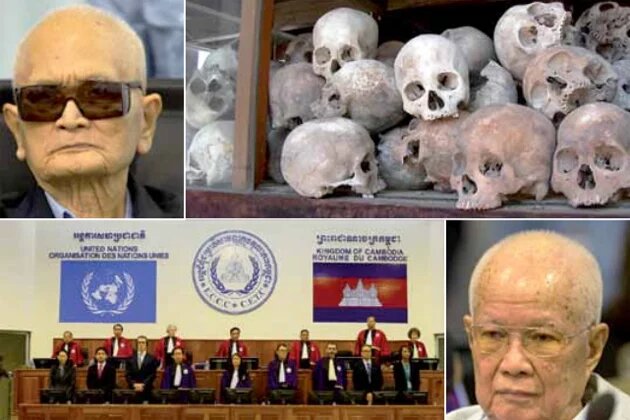
On the 7th August, 2014, the Trial Chamber of the Extraordinary Chambers in the Courts of Cambodia (ECCC) sentenced Nuon Chea and Khieu Samphan to life imprisonment, having found them guilty of crimes against humanity committed between the 17th April, 1975, and December, 1977. This verdict marks the completion of the first trial in Case 02, known as Case 002/01, which commenced on the 21st November, 2011, and concluded in October, 2013, after 20 months of evidentiary hearings.
Nuon Chea and Khieu Samphan were the last senior leaders of the Khmer Rouge Regime capable of standing trial. This trial was the first time that senior members of the Democratic Kampuchea (DK) have been held accountable for the crimes committed during the Khmer Rouge Regime. The Trial Chamber considered that Nuon Chea and Khieu Samphan, by participating in a joint criminal enterprise, perpetrated: 1) crimes against humanity of murder, political persecution, and other inhumane acts during the evacuation of Phnom Penh on the 17th April, 1975; and crimes of political persecution and other inhumane acts during the forced movement of the population in other regions of Cambodia from September, 1975, until December, 1977; and 2) crimes against humanity of murder and extermination through the executions of Khmer Republic officials at Tuol Po Chrey. The accused were also convicted for their roles in planning, instigating, and aiding and abetting the crimes of extermination and other inhumane acts, related to the enforced disappearances during the movements of the population and the political persecution at Tuol Po Chrey.
Only Nuon Chea was found to be responsible as a commander for the crimes committed during the forced movements of the population and at Tuol Po Chrey. With respect to Khieu Samphan, the Trial Chamber considered that through his position he had contributed not only to the design and implementation of the common purpose which resulted in the commission of the crimes; but also the endorsement of the DK policies, both domestically and internationally. The Chamber sentenced the accused to life imprisonment, taking into consideration the nature and gravity of the crimes committed, the Supreme Court Chamber’s decision in Case 001, and precedents from other international tribunals.
Significantly, the Chamber considered sufficient funding had been secured to endorse the implementation of 11 reparation projects, namely: the institution of a National Remembrance Day project; the construction of a memorial in Phnom Penh to honour victims of forced evacuations; a testimonial therapy project; various self-help groups; a permanent exhibition; a mobile exhibition and education project; the inclusion of a chapter on forced population movement and executions at Tuol Po Chrey within the Cambodian school curriculum; the construction of a peace learning centre; a booklet on adjudicated facts and civil party participation at the ECCC; two editions of the verdict in Case 002/01; and the inclusion of Civil Party names on the ECCC website.
At the time of the Court’s decision, the Heinrich Böll Foundation held a conference in order to assess the impacts of the Judgment on the transitional justice process in Cambodia, and to analyse the legacy of the Khmer Rouge Tribunal.
Mr. Ali Al Nasani, Country Director of the Heinrich Böll Foundation, Cambodia, opened the conference. An introduction to the first panel was delivered by the German Ambassador, Mr. Baron Von Marschall, who addressed the German perspective of the ECCC and international criminal justice.
The first part of the discussion considered the legal aspects of the judgement. Mr. Salim Nakhjavani, Assistant Prosecutor at the ECCC, Ms. Sin Saworn, lawyer from the Cambodian Defenders Project (CDP), and Mr. Lars Olsen, Legal Communications Officer at the ECCC‘s Public Affairs Section, participated in the discussion with the moderation of Dr. Daniel Heilman, Legal Advisor to the Senate of Cambodia.
An introduction to the second panel, focused on the victims’ perspective of the Judgment, was delivered by Ms. Ly Vichuta, lawyer from Legal Support for Children and Women (LSCW). The second panel was formed by Dr. Ken Carswell, from Transcultural Psychosocial Organisation, Cambodia (TPO Cambodia); Ms Lach Sreytouch, from Cambodian Human Rights Action Committee (CHRAC); and Mr. Ly Bunthea, from Youth Resource Development Program (YRDP); with the moderation of Ms. Thyda Kus from SILAKA.
This publication recounts the discussion and debate that took place during the conference, held at Meta House, Phnom Penh, Cambodia, on the 12th August, 2014.
For full reading of this article, Please download the PDF file at the right top